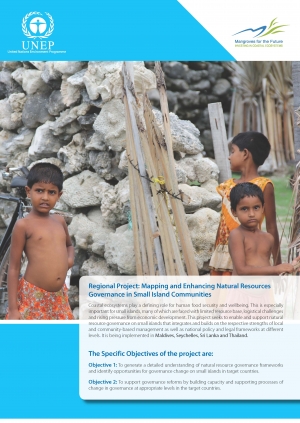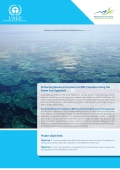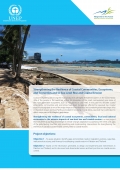Newsroom :: News :: Coastal erosion, small islands, and responsible diving on regional MFF spotlight
Coastal erosion, small islands, and responsible diving on regional MFF spotlight
MFF's regional grant facility projects release information showcasing nature-based solutions
Location: Bangkok, Thailand. 24th Oct 2013
Three new brochures were released and distributed to participating countries as part of the project's information campaign. The brochures are also available on the MFF website's regional project pages. See brochures attached on this page.
The first regional project, "Mapping and enhancing natural resources governance in small island communities", seeks to enable and support natural resource governance on small islands to integrate and build on the respective strengths of local and community-based management as well as national policy. The project is being implemented in MFF countries Maldives, Seychelles, Sri Lanka and Thailand. Ongoing project activities include a national review on natural resource governance frameworks and capacity needs assessment for communities and local government officers. A key output of the project will be a resource toolkit for community involvement in natural resource governance in small islands.
The second project, "Protecting marine ecosystems in MFF countries using the Green Fins approach", aims to improve environment-friendly practices in the diving industry and local communities, by applying responsible diving tourism principles. "Green Fins", which is a collaborative conservation management mechanism, emphasizes marine ecosystem protection and coral reef monitoring. The approach is already adapted by the diving industry in Thailand, Indonesia, Malaysia, and the Philippines. Implementation is now ongoing in Maldives and Viet Nam. National teams are now being established and trained in the Green Fins approach.
The third project, "Strengthening the Resilience of Coastal Communities, Ecosystems, and Economies and to Sea-Level Rise and Coastal Erosion", aims to develop practical knowledge in climate change adaptation by prioritizing interventions that strengthen resilience of ecosystems and communities to coastal erosion. The project is being implemented in Pakistan and Thailand. A national assessment report is presently being consolidated by the two countries.
The brochures were also presented during a workshop organized by a related project of UNEP's. The UNEP Coordinating Body on the Seas of East Asia (COBSEA) held a concluding workshop synthesizing the results of its Sida project "Spatial Planning in the Coastal Zone - Disaster Prevention and Sustainable Development". Countries Thailand and Viet Nam reported that the outputs from this COBSEA Sida project were used to inform the planning and implementation of the MFF regional projects they are participating in. Thailand is implementing the coastal erosion project with COBSEA, and Viet Nam is implementing the Green Fins project with UNEP.
Both Thailand and Viet Nam agreed that the UNEP COBSEA outputs (in particular, marine spatial planning studies) are very useful to the MFF RGF Projects.

Mapping and enhancing natural resources governance in small ... © MFF, 2013
Related Documents

Mapping and enhancing natural resources governance in small island communities
Author: UNEP
Publisher: UNEP
Posted on: 14th Nov 2013
Category:
Size: 2.9 MB

Protecting marine ecosystems in MFF countries using the Green Fins approach
Author: UNEP
Publisher: UNEP
Posted on: 14th Nov 2013
Category:
Size: 4.1 MB

Strengthening the resilience of coastal communities, ecosystems, and economies to Sea Level Rise and Coastal Erosion
Author: UNEP
Publisher: UNEP
Posted on: 14th Nov 2013
Category:
Size: 2 MB